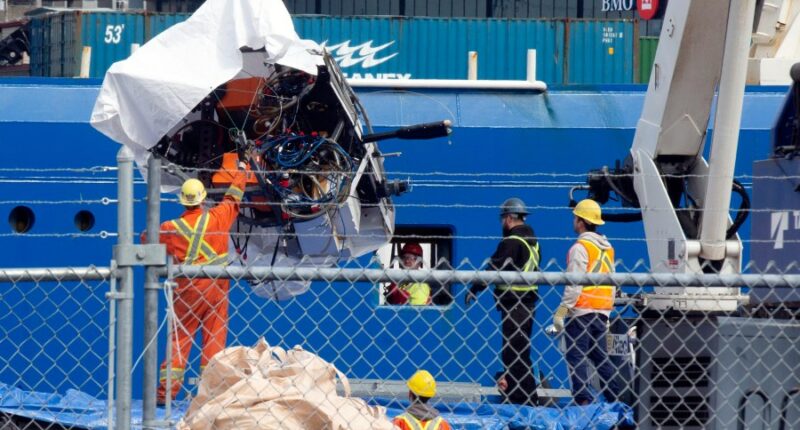Share this @internewscast.com

The Coast Guard’s report on the Titan submersible tragedy that claimed five lives en route to the Titanic concluded that the implosion was “preventable.”
The loss of the Titan near Canada in 2023 sparked a global search, prompting the Coast Guard to launch its most thorough level of investigation.
The submersible, owned by OceanGate—a private firm in Washington state—was operated by its head, Stockton Rush, who perished alongside four others. There were no survivors.
The investigation revealed the company’s safety measures were “critically flawed,” highlighting significant gaps between their safety guidelines and the actual practices observed.
The submersible disaster has led to lawsuits and calls for tighter regulation of the developing private deep sea expedition industry.
Jason Neubauer, with the Marine Board of Investigation, said that the findings will help prevent future tragedies.
“There is a necessity for enhanced oversight and defined options for operators venturing into new concepts outside established regulatory standards,” stated the report.
Spokespeople for OceanGate did not immediately respond to phone calls seeking comment on the report. OceanGate suspended operations in July 2023.
Investigators found that the submersible’s design, certification, maintenance and inspection process were all inadequate.
The extensive report, exceeding 300 pages, consistently cites OceanGate’s approach of minimizing, disregarding, and even fabricating critical safety data to bolster its image and evade regulatory scrutiny. It notes OceanGate’s neglect of “red flags” and its “toxic workplace culture,” compounded by a lack of local and global frameworks for operating submersibles.
Numerous OceanGate employees have come forward in the two years since the implosion to support those claims. The report says firings of senior staff members and the looming threat of being fired were used to dissuade employees and contractors from expressing safety concerns.
The report alleges that for several years preceding the Titan’s explosion, OceanGate “leveraged intimidation tactics, allowances for scientific operations, and the company’s favorable reputation to evade regulatory scrutiny.”
“By strategically creating and exploiting regulatory confusion and oversight challenges, OceanGate was ultimately able to operate TITAN completely outside of the established deep-sea protocols,” the report found.
The Marine Board said one challenge of the investigation was that “significant amounts” of video footage evidence that had been captured by witnesses was not subject to its subpoena authority because the witnesses weren’t U.S. citizens.
In addition to Rush, the implosion killed French explorer Paul-Henri Nargeolet, British adventurer Hamish Harding and two members of a prominent Pakistani family, Shahzada Dawood and his son Suleman Dawood.
___
Associated Press writers Kimberlee Kruesi in Providence, Rhode Island, and Leah Willingham in Boston contributed to this report.
















